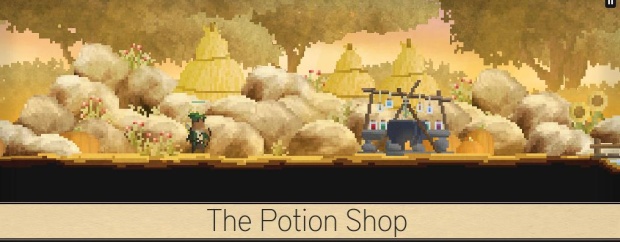Wot I Think: Words For Evil
Let me spell it out for you
When I wrote about the fun, if extraordinarily familiar, Letter Quest the other day, a former PopCapper, Dylan Loney, got in touch to say that he too had created a spelling-based side-scrolling combat game – Words For Evil. Well, the more the merrier. I've spent a spell of time with it (GEDDIT?!), and here's wot I think:
Words For Evil is not a good name for a game if you want Google hits, by the way. It's a bit like calling your game, “Pictures of Justin Bieber”. It's also a rather odd little game in itself.
With some rather gorgeous pixel art, an growing party of adventurers, and hundreds of different monster types to kill, it immediately looks different to that always watching Bookworm. And it plays very differently too. Here you have a 7x5 grid of letters, from which you need to rapidly spell words by linking together adjacent tiles (including diagonally). Except, any word you spell has to contain a coloured tile if it's to do any damage. Colours are specific to heroes, and the more of them you have in your team (up to three), the more colours there are on the grid. Form words using multiple colours and they'll attack at the same time, and include more than one of each colour and further attacks are unleashed.
And it's in ‘real-time', so the monsters will just keep hitting at you if you're spelling or not spelling, until one of you is dead. This means the emphasis has been taken off spelling big long words, and focused on hammering out four or five letter words as a priority, trying to get as many coloured tiles in them as you can. And this is made far easier by the game's smartest inclusion: letting you use the keyboard.
It's extremely smartly done. Clever bits of code mean that as you type, it selects the letters that are capable of putting that word together in the grid, and seemingly prioritises coloured tiles if the same word could be spelt out without securing an attack. It also doesn't let you type in impossible letters, meaning you can become enormously speedy at typing in words, or discovering ones even your eyes hadn't spotted yet as you hit and hope. (This primarily works for me in habitually trying to stick an S on the end of most words, to see if can be done.)
Alongside these main battles, there are three other micro word games. There are traps, where you try to eliminate fifteen tiles by spelling words that use them all up exactly – any letters left over determine how much damage you take from the trap. There are chests, which are opened by finding a (usually obscure) five-letter word that's spelt out over two rows of tiles. And there's a last-ditch life-saving game where you must solve a seven-letter anagram to restore your character's health. (Find six letters and you'll get half health.)
All this is then combined with a rough RPG system for your characters. XP is scored as you play, which allows you to level up your attacks – and divide that levelling between attacks based on one, two or three of the same colour tile appearing in a word. You can also buy armour and weapon points, and potions to drink before fights.
As you go, new characters will offer to join your team, and you can swap someone out if you're willing to start over a new member because of any skills he or she may arrive with.
It sounds like an awful lot of stuff going on, which makes it all the more strange that, as you play, you quickly discover that almost none of it translates to what you play. Within minutes, despite all this detail, Words For Evil enters a looping pattern that doesn't vary. I ploughed through all six locations in a single go, and although I lost a couple of heroes from my team (due to really obscure anagram words), I didn't feel challenged until the 'final' monster - a fun, close fight with a dragon. Not that it was the final – the game maintains its feeling of being an endless runner by continuing on after that, letting you keep fighting while completely upgraded and so offering even less challenge.
It's most odd. Hammering three-letter words is always enough to win a fight, meaning there's little incentive to aim for something smarter or more tricky. And the monster attacks are just regular, on the beat, unvarying from creature to creature – they might as well be another countdown timer for all the difference it makes what you're fighting. I levelled up at the same pace as the baddies, so nothing seemed to change there, and it rapidly becomes enormously monotonous.
Were the game to become increasingly difficult, then you'd have something here – the challenge to see how far you can get into the game before your potions, skills, and spelling don't prove enough to counter the attacks. Restart, try harder, do better. And so on. But when there's pretty much no chance of failing, this becomes an idle affair.
It's very nice to look at, but you quickly realise that each of the six locations is actually exactly the same. Same structure, same shops, same pattern. I had more gold than I could ever spend, meaning I could always buy all potions and upgrades that were available. It reveals all it's going to so quickly, and has nothing up its sleeve for later.
It's only $5CAD (£3), but as it stands, it's too hollow. It either needs to give you a purpose in succeeding, in continuing onwards, or it needs to make it far more difficult to do so. In this middle place, it's stuck in neutral.
You can buy Words For Evil from itch.io for $5, and vote for it on Greenlight here.





